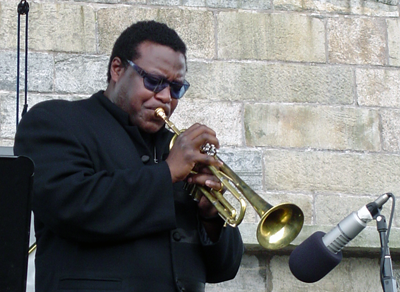
News
Summers Will Not Finish Semester of Teaching as Harvard Investigates Epstein Ties

News
Harvard College Students Report Favoring Divestment from Israel in HUA Survey

News
‘He Should Resign’: Harvard Undergrads Take Hard Line Against Summers Over Epstein Scandal

News
Harvard To Launch New Investigation Into Epstein’s Ties to Summers, Other University Affiliates

News
Harvard Students To Vote on Divestment From Israel in Inaugural HUA Election Survey
Artist Spotlight: Wallace Roney
Wallace Roney, a talented and worldly jazz trumpeter, is currently on campus as part of an Office for the Arts Fall Jazz Residency. Roney, who has performed with his own band on and off since the late 1980s, has worked with a varied medley of collaborators since he first began learning the trumpet at age six. He is the only trumpet player that music legend Miles Davis ever personally mentored.
Roney has been collaborating with the Harvard Jazz Bands to celebrate the legacy of Miles Davis. Their joint performance, “A Tribute To Miles Davis,” was held on Nov. 8 in Lowell Lecture Hall. Before the show, The Crimson sat down with Roney to discuss his work and influences.
The Harvard Crimson: Tell us about “A Tribute to Miles Davis.”
Wallace Roney: I’m going to be playing with the Harvard Jazz Band—the Sunday band and the Monday band. So they’re going to be playing selections and compositions associated with Miles Davis.
THC: Will you be improvising alongside them?
WR: Jazz solo is improvisation. We don’t read our solos, we read the melodies or we read the compositions. Then we develop our own themes. If you’re reading someone else’s solos, you’re not playing jazz, you’re reading the compositional part of the music. Unless you’re quoting a great solo—you might want to quote something from John Coltrane or Charlie Parker. That’s still a part of improvising, though.
THC: Tell us about the trumpet in particular. Was there a reason why you chose this instrument at such a young age?
WR: My father and his friends—and a lot of people in Philadelphia—were very much into jazz. And different households would have friends come over on weekends to listen to music. My father’s household was one of those. The guys would come over—every Friday, they would buy the latest records and come to my father’s house to sit and listen…. My father also loved the trumpet; he started to take lessons, and he bought one. I saw him play, and it was amazing. And that’s what I wanted to do when I heard the sound off the records. I heard Miles’s records, I heard Lee Morgan with Art Blakey, "Cannonball" Adderley, and all these guys, Blue Mitchell with Horace Silver. And the sound just spoke to me.
THC: How do you walk the line between innovation and tradition?
WR: Innovation is the tradition. What you’re trying to do is create music. Eventually, the music forms itself and changes. Or evolves. That’s the innovation right there. If someone has an idea that jumpstarts it, then that is what has been happening all along. So innovation is the tradition.
THC: A lot of creativity comes from daily experience. Where do you find creativity in your daily life?
WR: Creativity is the art of doing something you need. If you’re going to drink coffee on a daily basis, what if you drink coffee and add something special to it? Or take something away? Creativity is something that changes the way you think. Making the ordinary better, trying to make the daily routine better.
THC: Excellent musicianship is often enhanced by great collaboration. You’ve worked, for example, with some of the best drummers in contemporary jazz. Who are your favorite people to work with and why?
WR: First of all, they always say I’ve worked with the best drummers in jazz. I’ve also worked with some of the best piano players! I’ve played with all the greatest artists, and all of them have been special. Because that’s what you do—you find the beauty in everything.
THC: What do you think is most important when teaching the art of music?
WR: I think teaching the art of music is an art. It has been taught for the last 1000 or more years in a systematic way in Europe and in Africa, both performing and watching the masters. In jazz, you have both. You learn in a systematic approach, in a classical approach, and you learn from a master…. Probably, when you’re becoming a doctor, you learn both from the surgeon and [from the book]. And watching things that are not in the book that will be part of the book someday.
As far as my teaching, I had some very great teachers, classical and jazz. Dizzy Gillespie and Clark Terry were ones who really taught me a lot. Art Blakey was probably one of the greatest teachers of all time, as well as being one of the greatest innovators on the drums. And then of course we have Miles Davis, who was one of the most innovative musicians in the last 200 years. I learned a lot from Herbie [Hancock] and Wayne Shorter. I don’t consider myself a teacher, per se, but when I do clinics and workshops, it’s easier for me because I can talk about what I learned from these guys…. Performers are still the geniuses, but the teachers are the administrators, and they’re to be respected.
Want to keep up with breaking news? Subscribe to our email newsletter.

